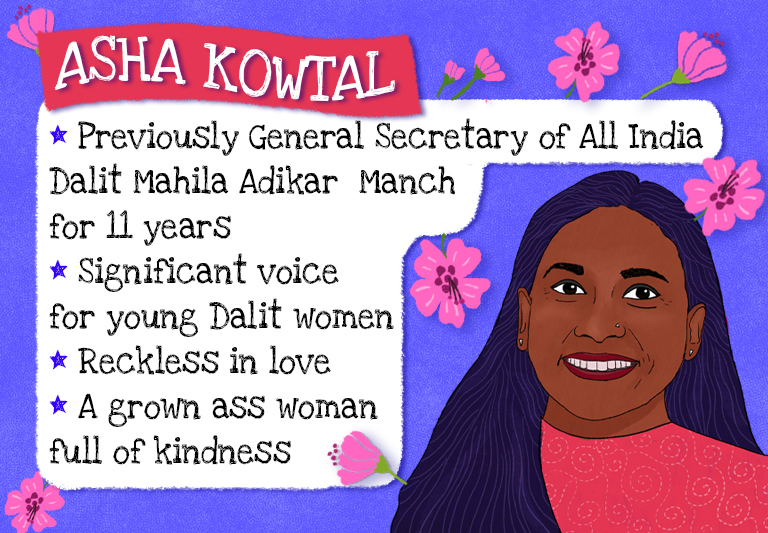
Asha Kowtal was the General Secretary of the All India Dalit Mahila Adhikar Manch for eleven years in Delhi. She continues to be a significant voice among Dalit women who have made it possible for younger Dalit women to forge ahead. In 2020, she added two new young members to her family and moved to Kerala. I wanted to interview Asha because she makes me want to keep my faith in love alive even after I have grown up. She dreams of love and this is a quality that is most infectious about Asha. She redefines many of the qualities that I used to associate with the idea of a grown-ass woman. For a long time, I believed that loudness, the ability to say fuck off, a devil-may-care attitude were essential to a grown-ass woman. Asha is nothing like that. She has gumption, a quality I love in women. But it’s not the kind of gumption that comes from gumption. She is the kindest person I know and when I was given the opportunity to interview a grown-ass woman, she was the first person I thought of. Despite having spent considerable time as an activist, working at the grassroots, leading young Dalit girls to the forefront of Dalit-led movements, managing some very challenging obstacles in very stressful situations, her determination to always respond with kindness is something I continue to be amazed by. This interview documents some moments from our Q&A that I hope to carry wholeheartedly into my quest for being a grown-ass woman.
So, who is a grown-ass woman to you? How would you describe her?
First, grow a big bum, then you will be a grown-ass woman! (Laughs)
I mean, I don’t want to give fundas around decision-making, being independent, free thinking, all of those things.
When I was put into my role in the collective, I thought this was my community, my people, my sisters. I had to do what needed to be done. Through my journey in the AIDMAM, I became a grown-ass woman. So, I think, as a grown-ass woman, one would be truly committed to their current context and really hopeful for what she wants to give for whatever is coming up. I think realising and understanding that you are carrying the history of how you’ve reached here is being grown-ass too. Because I think that history will always be there to bite that grown ass.
I feel a grown-ass woman also finds grief. Because your history also brings a lot of grief. And I think you are aware of all that too along with everything else that comes in your life. I’m thinking of those sounds at our 2018 Dalit Women’s conference, the parai beats, and then the yelling and screaming. Then I was thinking about that time you conducted a writing workshop for us and we wrote our love stories, where we were sitting around, reading each other’s poems and cackling away.
Even those moments that, you know, we didn’t know what to do when we were just sitting in the room and crying so many times we really could only just cry. We didn’t know how else to respond to the things we wrote and read out loud.
Remember that workshop where the first half of the day we wrote these stories and all of us were just crying, and then we wrote funny stories and couldn’t stop laughing?
Exactly, exactly that.
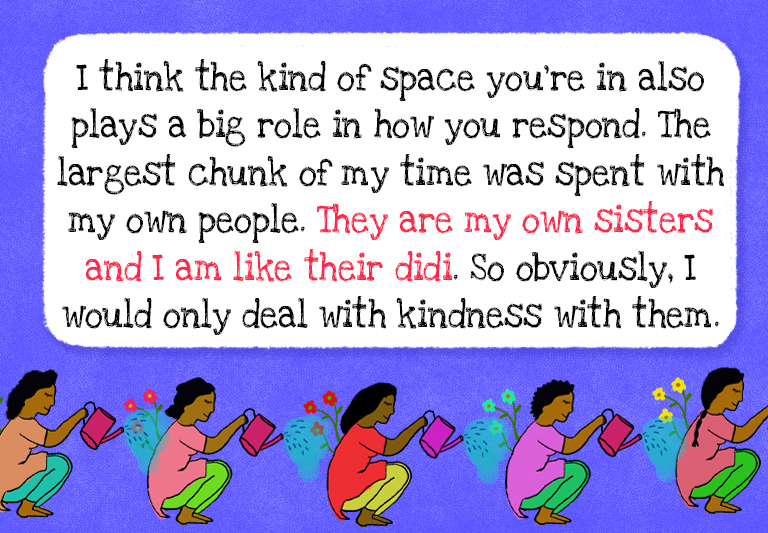
I remember the first time I saw you. It was during the inauguration of an All India Dalit Mahila Adhikar Manch (AIDMAM) conference few years ago. It was time for the next session in the schedule but there were women on stage who couldn’t stop singing. They were so carried away. As organiser, you were responsible for keeping track of time but you didn’t interrupt them, you didn’t stop them from their celebration. This quality of kindness is something I always associate with you. It’s very inspiring. How do you find this kindness in yourself?
Actually, like you, a couple of my other friends have also said this about me. But I never did any of this intentionally. I don’t know any other way to be, really.
When I was with the AIDMAM in a leadership role, I was given a lot of power. Of course, we were doing a lot of work collectively within the organisation, yet I was signing things, taking accountability for a lot happening within the organisation, with events that I was organising, within the press releases I was giving. It was about how I understood my role and the power I had in that position. I could have said “Hello, stop it” to the women on stage but I think I never exercised my power in that way. I never thought about what others will think of me based on my behaviour or reaction. At every moment, I know that as Dalit women, we are different. We have different needs and we will surely carve a new path for ourselves to meet them. But if I use my power to curb any of us in any way, I find it silly. I would be the last person to do something like that.
Now that I think of it, I also feel maybe a lot of this came from my mother. A very strong, compassionate woman she is. I kept thinking through my life, oh my god, I don’t want to be like my mom. I mean, I’m different from her in so many ways. But this part of me, I think, does come from her big heart.
Growing up, I used to think that the only way you could be independent and sure of yourself was by being rude, loud and telling people to fuck off. I didn’t think adults or grown-ass women could be kind…
I think the kind of space you’re in also plays a big role in how you respond. If you’re dealing with a lot of Savarna women, because you’re put through so many situations, you end up having those feelings of anger and respond in that way to sound firm and clear about what you want to say. The largest chunk of my time was spent with my own people. They are my own sisters and I am like their didi. So obviously, I would only deal with kindness with them.
A workplace like the AIDMAM is an unusual one, in the sense that while you are part of a sisterhood, you also have to be a boss like when you train younger Dalit women in the job or help them discover their areas of interest. How do you negotiate between these two roles?
Like you said, in these collectives, we don’t just login and log out of work every day. I think institutions that want to maintain a status quo, a hierarchy demand that kind of framework and attitude.
The way in which we Dalit women operated was completely different. It was a community-led process. We were learning and growing together. Each of the women I’ve worked with have known all the shifts and changes in my life. Even without explicitly saying anything, everyone has been there for me. So, the line between our official work and personal lives is very blurred. None of us know how to separate the two.
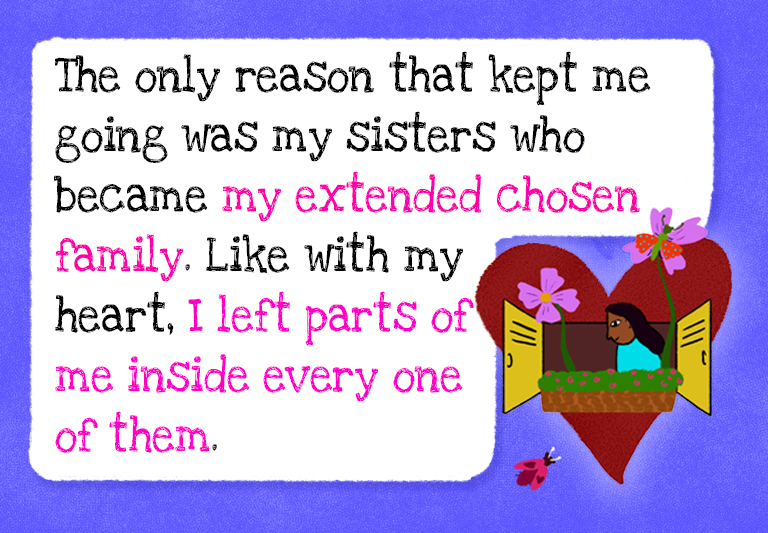
Because they’re so personal…
Because they are so personal, the relationships that we have. My life and their lives were intertwined in so many ways.
In my whole leadership arc, the sister role was always overarching in my mind. In fact, this was something I got a lot of flak for. My sisters in the collective would tell me that I shouldn’t always be so accommodating, that I should be more strict – danda leke rakhna chahiye. But my point was that everyone in the collective was not here for just a job. It meant much more to them, so we had to take into account their circumstance, their context.
My role was always a nurturing one. It was about individual and collective growth, trusting and believing that everyone here is committed to Babasaheb Ambedkar’s mission and will not do anything detrimental to each other or the collective. But if someone did do something like that, they would have to step away by themselves. Because hum log yahan pe kuch sochke aaye hain, our commitment is towards our people and our community. In this context, if you say danda leke, it doesn’t fit into what we’re working towards.
Only for some organisational things, I was a leader. Otherwise, I saw myself as somebody journeying together, learning together with everyone.
Having worked in such an environment, can you imagine yourself working in a Savarna dominated workspace?
No, I definitely can’t imagine myself working in a Savarna-led work place or environment. I also can’t imagine myself working in a Dalit male-led situation. I think my mind space, heart and energy can’t go into dealing with men in the workspace for justice for my people.
You can run programs for Dalit women. You can get very large grants for Dalit women. You can even have Dalit women lead the programs that you’re designing. But I don’t think the deepest insecurities of our young girls and young women leaders, their deepest desires, their deepest aspirations, will be addressed through these kinds of programs. Especially those that are led or designed by those Savarna folks or Dalit men.
The only reason that kept me going was my sisters who became my extended chosen family. Like with my heart, I left parts of me inside every one of them.
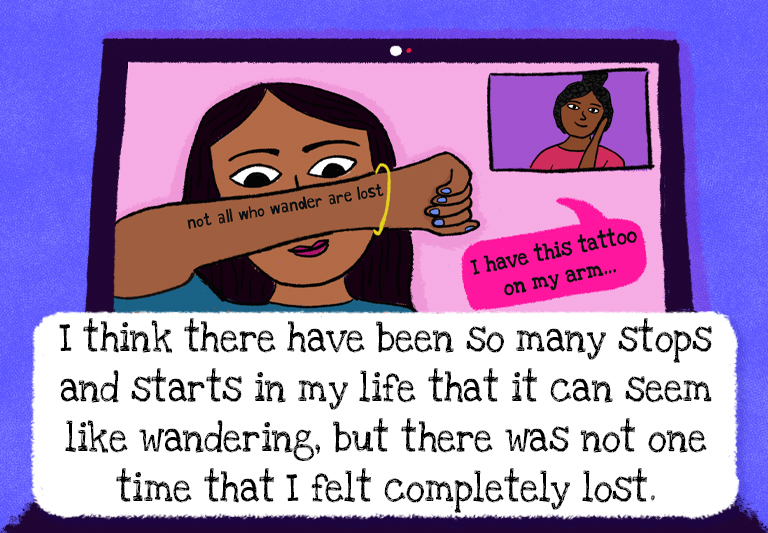
Another thing I think of when I think of grown-ass women is that they know what they want to do and they just go ahead and do it. They don’t wait for anyone’s permission. You were born in another part of the country but when you moved to Delhi, a completely new place, what was that like?
When I moved to Delhi, I was a complete newbie. I had no clue about Delhi. I had never lived in North India. I had never worked in Bihar, UP, Haryana, Rajasthan. But I realised that I’m here because I want to do something for my people, and if I have got that privilege within my people, I should use it for playing that role.
So however difficult or hell-like it was, I had to be a grown up, a grown-ass woman and do it. And I did it. I can’t say that I was fully ready for all the demands that were made of me. But in terms of my heart and my commitment, they were both in the work a hundred percent. I was sure this is where I wanted to be. It was a huge shift for me but I did it because I knew that whatever I contributed here will lead to a long-lasting impact for the movements for my own people.
I was put into this place where I had to be grown-ass or a grown up, at so many points, especially in my work related to the Dalit women’s movement, the All India Dalit Mahila Adhikar Manch. The pits that came along were really, really deep. And, I can’t say that I very confidently clambered out of those holes. (Even when I moved on) I remained confident because I was committed to what I was doing at that point in time in my life. And always with the hope, possibly some kind of dream that I’m going to be part of something new, so I need to move my energies to that. That’s how my journey has been.
It’s not that I felt redundant, but I felt very convinced that there is something new, something else, and to enhance your energies, you have to shift to that. And, what you have in your hand will not just fall between your fingers, but it will solidify, it will crystallise, and it will remain simply because of the commitment with which you have engaged. This I am saying not only for my work, even my own life situations and my relationships.
As children, we are told we should be thankful for what we have and if we keep wanting more, we’ll become greedy and there’ll be consequences, punishments or what we have now will also be taken away. There’s also a fear that there may not be anything good on the other side. How did you learn to let go of that fear and start afresh?
I have this tattoo on my arm that says ‘Not all who wander are lost’. I think there have been so many stops and starts in my life that it can seem like wandering, but there was not one time that I felt completely lost because as I said, I was committed to what I was doing at that point in time.
With the AIDMAM, I feel that the decision to step aside or transition from that role was fuelled by so many other things. After so many years of being at the frontline of the movement, my energy was being drained into matters that were not leading to what I was hoping for my people, for the work that I was doing, or you know, the mission.
It was getting drained elsewhere, in confronting misogyny within the movements, confronting institutional frameworks and systems, keeping up systems and status quo, which wouldn’t really translate into long-term impact for your people. So, I chose rather to put my energy in some other place, to compliment that existing process. That reduced this dreadful feeling, or the fear of leaving something behind. I neither had the feeling to drag myself back there because I was convinced that for what I wanted to do within the collective, there can be alternative frameworks.
And this was the time to put my head and heart into finding those alternative frameworks, which will complement what you have already been part of and contributed to build. That I think I was convinced about. So, I decided to take a break and step aside, let things float and move. And in the meantime, to just pause. Just pause and think and figure new things out.
But this is not the same for every other situation. In terms of relationships, other challenges that came up in my life, that feeling you mentioned and the things we have been told since childhood can really create havoc and is a reality in my life too.
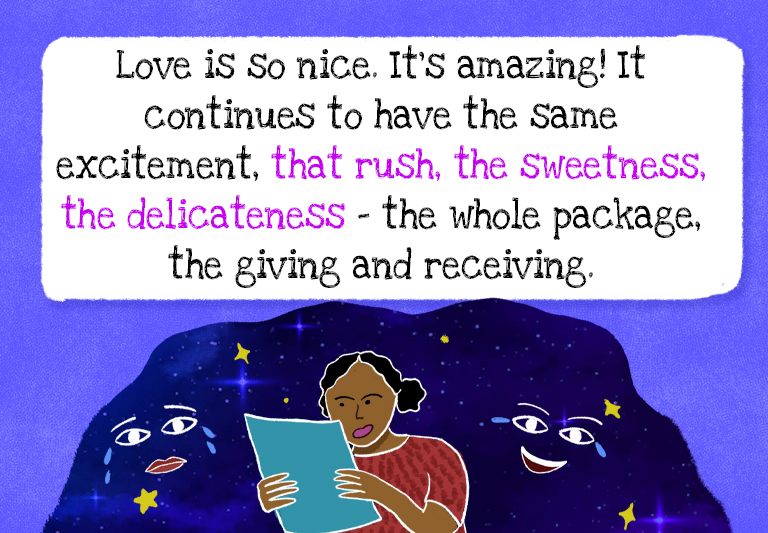
Where are you in life right now?
I was recently thinking how it’s been two years since I left the AIDMAM.
But then, I swear, I never felt like shit about myself or felt useless. I’ve never questioned myself about what I’m doing. I actually feel so much more at peace that the process I have contributed to is going on and at this time, when I’m thinking of a new thing, it’s better – a hundred percent better, than being in that place and battling Savarna people and Dalit men. It’s better.
Even if I’m not “actively out there”, this is better than draining all my energy. I am fully convinced of this. I have only chosen to be in a place which is affirming, which is rewarding for my own self.
And it’s really okay because the lessons that I have learned in these two years are so brilliant, so mind blowing actually for me as a woman, a Dalit woman, myself otherwise, and also what it can mean for the long-term sustenance of us Dalit women, really, you, me and everyone.
If we are looking for a world for our children and their children, you think about what Babasaheb said all those years ago. We may not be anywhere there yet, but at least I know the path I will not take to get there. That for me affirmed the current place where I am.
What do you desire for yourself at this moment?
I desire to be healthy for as long as I can. To be surrounded by children and the special people in my life including those that I have chosen to be my family. I think children have taught me a lot of lessons in terms of what kind of a world they will have, whether it’s patriarchy or their own identities, what we as adults have the power to do or the role to play in their lives. Those parts of me that I started with, that were there with all the women leaders and sisters from the movement remain connected to me through the children. Although I don’t know if that nurturing role with my sisters is the same with the children.
I feel that in the long-term maybe organisations will die away, maybe policies will change, the FCRA (Funding Contribution [Regulation] Act) may go, funding may go, but what will remain are these relationships with each other.
Outside of the movement, outside of the organisation, what do you want just for yourself?
For me, I think in matters of falling in love, I’m a very reckless person. Like you just free fall into it. I’ve always been like that. And I think that is the core of who I am. It hasn’t changed with age or anything. I don’t think it will also.
However crazy, however risky it may sound, I think it’s very special and don’t ever want to lose that. I want to remain like that.
As I’ve grown older, I’ve found it hard to not only accommodate my desire for someone else, but also to believe that anyone else will desire me. I feel more guarded than I did in my 20s. What has your experience been like?
First of all, there is no age to love. I don’t think there’s any physical shape to this or that it matters how your hair or skin looks like, or how so called attractive or whatever you are. Really, believe me and trust me on this. I think it’s so magical how when love happens, you are just swinging with it and going with it.
I can’t be calculative about falling in love. Maybe that’s also why I’ve fallen flat on my face in these matters sometimes. There was that free falling in heartbreak too. But that’s a different story. When I’m falling in love or am in love with someone, I’m not constantly thinking will this person become something else, will they cheat on me, will they treat me well, this or that. I’ve never cared whether the person has this.
This is the way to fall in love.
Yeah. This is the way to fall in love. Otherwise, imagine, you will sit with a checklist of whether this person has this or that…I just don’t know how to do that.
We need to hear this more often. Especially now when no one wants to get hurt and so we protect ourselves even from love.
I lost the person I loved when I was 22-23 in a very tragic accident. I think that changed my life forever. At the time, I didn’t think anything was possible. But when I look back, I don’t think one tragedy can change the whole trajectory of your life. Your trajectory is defined by so many different things.
If you are desiring something for yourself, you will go for it. Also, because love is so nice. It’s amazing! It continues to have the same excitement, that rush, the sweetness, the delicateness – the whole package, the giving and receiving. But I think there might be something that age also has to offer. I think I am open to receiving more love now than when I was younger. I don’t know whether it’s a 40s thing. It can obviously alter your life in so many beautiful ways, at points in your life that you never perhaps expected. I think I have received more love in my 40s.
So yeah, how I fall in love has remained the same. But what I gave and received at that time is very different from what I give and receive now.
Have you ever fallen out of love?
Yeah, I think I have fallen out of that feeling of love, but I’ve never fallen out with the person. I never wished bad for them. I haven’t like kicked out the person or blocked, or cancelled that person. Whatever those words are, I don’t know how to say those things.
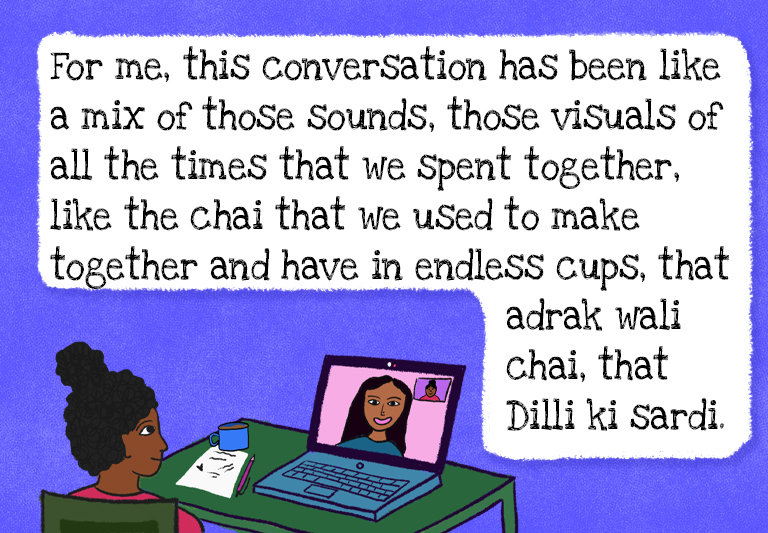
What was a moment or situation when you felt proud about yourself?
Some years ago, I went for a three-month fellowship program to the Netherlands, then I went to Columbia University to speak at a Babasaheb lecture and then to LSE (London School of Economics) for a while, and I remember thinking “My god! Babasaheb came here many years ago!” I was thinking about how he did so many things and asked myself what the hell are you doing? So, I kept telling myself I will do something. It may be a very small thing, but I cannot stop.
Through the yatras or tours we [at the AIDMAM] would go for, we would say it is linked to the caravan of justice that Babasaheb gave us. He had brought it so far. He had said, “Take it forward as much as you can but don’t do anything to take it back.” I felt like that clicked in my head.
Less than a year before I left Delhi and my role, I was fully excited and proud of myself because I knew what I wanted to do for the movement that I was and still am a part of. I had understood what the gaps were – not necessarily for the movement, but for me as a Dalit woman leader and for my own sisters. I understood that there has to be something else to which I should contribute.
And I knew that I could do it. And that’s why I decided to move out from there. I felt that that moment was a significant point in my transition (out of the role). I knew when I got out, it’s not that I’m going to cut off from everything. But I will be building something which will complement this. And that’s what I’m trying to do here with my life right now.
But yeah, two weeks within my quitting, the lockdown happened. Then the pandemic followed. There was a lot of crises within the collectives of Dalit women and my own physical and mental exhaustion. There was lots of treatment and therapy, it took a while. But I feel confident and happy now.
Every time I talk to you, I come out with a more reaffirmed version of myself. I think I am just going to live and love. It’s like, I came here looking for answers and you’ve given me a lot more than just answers.
For me, this conversation has been like a mix of those sounds, those visuals of all the times that we spent together, like the chai that we used to make together and have in endless cups, that adrak wali chai, that Dilli ki sardi. There are so many things we celebrated together. First-time birthday cake for so many of us, living together, sharing our clothes. I think this conversation also made me look back at my work-life and activism as a Dalit woman and also my own personal life. My own personal journey has been there in all of this. This is amazing. As you’re growing older you feel happy that you’re madly in love, you’re happy about what you want to do for your work. That you’re in a good place.
It is. I wish with all my heart that you’ll always be in love, every day, every year, never stop being in love and falling in love. That’s like the most amazing…
bere daari illa (No other way…)
































































































































































































































































































































































































































































































































































































































































































































































































































































































































































































































































































































































































































